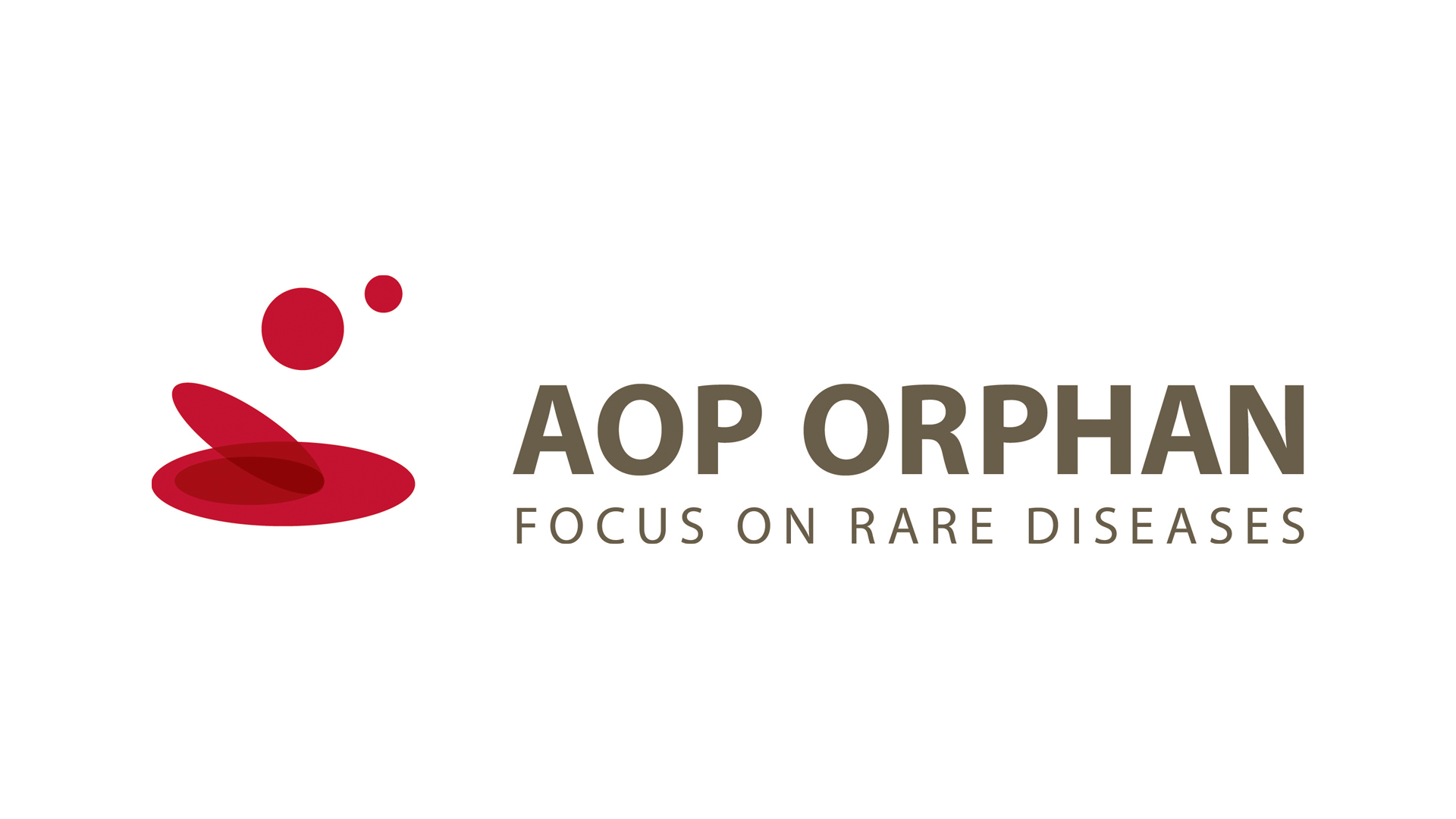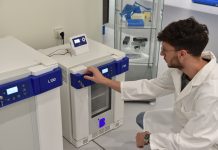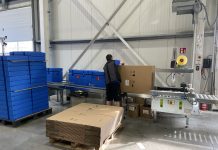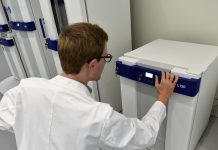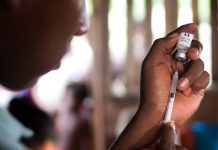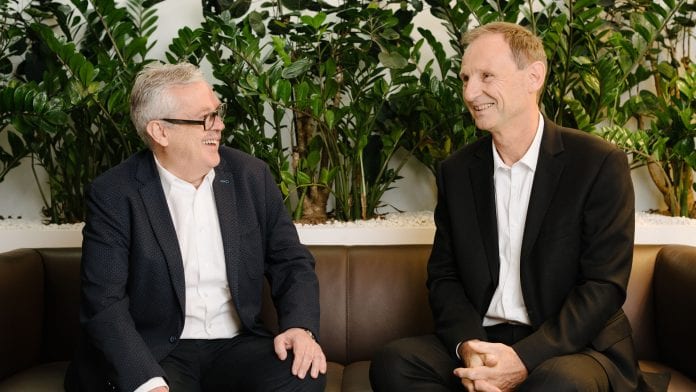
AOP Orphan Pharmaceuticals AG is an international pharmaceutical company focusing on rare and special diseases. The company has developed an innovative pen for the rare form of blood cancer – polycythaemia vera – that will help improve patient care.
Imagine you need to jam the needle of a syringe into your body to save your life – and not just once but on a regular basis. Normally, you might ask your doctor to do this for you, however, due to the ongoing COVID-19 pandemic, it is difficult, and even more difficult to go to a hospital. Now, imagine that this frequent act of saving your life is alleviated with the click of a pen at the comfort of your own home. Most of us have heard of such a device in the context of diabetes, and now, this simple DIY treatment-option is also available for polycythaemia vera, a rare form of blood cancer, patients.
While the outcome is an easy-to-use medical device, the process of getting there was anything but easy. Medical innovation is a long and winding road that takes years and requires specific scientific resources – and funding.
Medical research requires a support system beyond hospital facilities
“Innovations in medicine always have to be safe, effective, and beneficial for the patient by, for example, stimulating the self-healing process. However, the innovation also needs to be accepted by the patients as well as by the treating physician” says Rudolf Widmann, Chief Therapeutics Development Officer and founder of AOP Orphan Pharmaceuticals AG (AOP Orphan), a rare disease company based in Vienna, Austria. “If physicians don’t support the new treatment and patients are not open for trying the new option because the application is too cumbersome or error-prone, it will not be used.”
The premise is simple: provide something that improves patients’ lives and supports healthcare professionals in their work – but there is so much more to that.
“Developing new therapeutic concepts for diseases – especially rare and complex diseases – requires courage, ambition and, most of all, resilience” says CEO, Andreas Steiner, adding that, “Research starts with an idea. We have the ideas and scientists in house. Researching new therapy concepts and developing new drugs are complex challenges: the process is lengthy, cost – and resource-intensive, and only occasionally has a successful outcome. Getting through this process requires expertise in multiple areas and requires a close-knit and experienced team, that will not be deterred by unavoidable setbacks but persists until there is a solution. Over the years, countless experiments, setbacks, and improvements have allowed us to turn a mere concept into a finished product. And therefore, an improvement for patients.”
What helps innovations come to fruition is an environment that is research-friendly, open to new ideas, and has a basic understanding of the natural sciences. Europe looks with envy to the United States which welcomes and fosters innovation. While university clinics in Austria are very involved in basic research activities, “applied research, which develops the actual product, does not get as much support as basic research” explains Steiner.
Widmann added: “In Austria, we are also lacking a proper network to facilitate applied medical research. You need to know someone at an institution to make collaboration happen. If the connection doesn’t already exist in some form, it is rather difficult.”
When you go outside Austria and look at Europe as a whole, the issue is a different one: every country in Europe, and even within the EU, has its own national reimbursement process. According to Widmann, this added difficulty is also one reason why pharmaceutical companies prefer to settle in the US and move their jobs out of Europe. Nonetheless, he wants to keep AOP Orphan in Austria because he believes in the local healthcare system and because “Austria is my home country.”
What role does society play when it comes to accepting that health comes at a cost?
In Austria, a country with generous social services, as well as in many other developed countries, the outrage is strong when medical treatment comes with a price tag. The general mindset is that nobody should profit from someone else’s health issues.
“Why do we, as a society, expect that saving a life is for free? Nobody is surprised when other industries charge their services with a high margin. Why should pharmaceutical companies offer their products for nearly free when the resources – skilled staff, product components, medical trials – involve such high cost and an enormous risk of failing; long before the patients even get to benefit from it and before even knowing if the product will be approved for use?” asks Widmann.
“Only about 1 in 2,000 compounds make it to market and the development can take ten years and longer” adds Steiner. “Because research doesn’t just mean working in a lab, but also involves medical trials. Why would anyone take on such business risks – including financial risks – if there wasn’t adequate compensation at the end? The profit of a successful drug also has to cover the failures that were overcome along the way.”
Part of the responsibility of shaping public opinion also lies with the media. While the role of the media is, of course, to shed a critical light on issues, reporters often focus more on what goes wrong rather than what goes well. While at first, everyone was rooting for pharmaceutical companies to quickly develop a COVID-19 vaccine, it soon turned into scepticism about whether such speedy development can be safe and whether the occasional adverse event is proof that the vaccine may even be dangerous.
“We lack the celebration of successes! The media is quick in scaring the public. Why not also tell the public about medical advancements that help patients?” says Widmann.
If the development of a COVID-19 vaccine will be a true turning point for medical advancement, whether concerning a faster approval process by authorities or by shaping the public’s awareness about medical research, has yet to be seen.
Why the bottom line matters
While any kind of research in the health sector comes with a lot of risk, research in rare diseases has its additional challenges: there just aren’t that many patients. In the EU, a disease is considered rare, when it occurs in less than five per 10,000 residents. Austria has around eight million inhabitants, making it a difficult turf for medical research and therefore is not really a major player in the pharma world. Nonetheless, AOP Orphan made a name for itself as a European pioneer in the development of treatments for rare diseases, also known as orphan diseases, and has been running clinical trials all over Europe, Russia, and the Middle East. The company focuses on rare disease therapy options in the areas of haemato-oncology, cardiology and pulmonology, and neurology and metabolic disorders. AOP Orphan manufactures 80% of its products in Europe. Medicine Made in Europe has become an important issue in the current COVID-19 pandemic, not just in terms of accessibility – the closer to home the better – but also in terms of quality.
“If a patient with a rare disease is worth saving to a society then society must invest in providing life-saving measures for those patients. If not, you have to use what you have” says Widmann.
The polycythaemia vera pen has been developed for the treatment of the orphan disease polycythaemia vera and contains a specifically designed, novel drug. A five-year study showed that self-administering this pen every two weeks showed positive results for patients with this rare blood cancer. This type of long-term, evidence-based research is necessary to convince authorities that a new product will not only not harm patients but may be better than any existing treatment option. This new treatment has been approved in over 30 European countries.
Evidence-based research is also necessary for acquiring reimbursement status. “While we are happy that our therapies are able to help patients, it is disappointing, when payers turn to similar, off-label products because they are cheaper although they may lack proven efficacy in clinical trials” explains Widmann.
In the end, the healthcare industry is also about the bottom line – whether we like to hear it or not. If a new medical device or drug does not have a pharmacoeconomic benefit for the patient, the hospital, or the physician, it will most likely not be used. Hospitals and hospital pharmacies are also businesses that need to show fiscal responsibility. While physicians and other healthcare professionals may prefer one product over another because they know from experience that it works better, the decision to use a different product because it is cheaper is still common. Pharmaceutical companies and healthcare professionals need to show how a more expensive product will yield a better return on investment by, for example, requiring fewer treatments or check-ups, needing lower dosages, or shorter hospital stays. Only comparing drug prices is probably not the right approach.
Another example for this from the AOP Orphan portfolio, is a short-acting agent for heart rate control; meaning that it is broken-down and eliminated quickly by the body compared to other agents with the same purpose.
“The product is without a doubt an expensive one but can, in turn, significantly reduce the number of days a patient has to stay in the hospital” Widmann explains.
“When it comes to the true cost of healthcare, we need to look at the bigger picture – medication, patient experience, patient services, savings through innovative treatment solutions – rather than the individual cost of each component,” emphasizes Andreas Steiner. “We need to change our point of view about the system.”
The Future of Healthcare
The current COVID-19 pandemic is a good example of why it is important for patients to be able to take care of their health challenges themselves as much as possible. The pandemic has put people with other health problems at a disadvantage as healthcare professionals are so focused on saving COVID-19 patients that it is difficult to gain access to physicians. Hospitals restrict general access to their facilities in fear of bringing COVID-19 onto the premises. This may deter some people with rare diseases that have not been diagnosed yet to seek help in fear of imposing on the already strained healthcare staff or even in fear of catching the virus while at the hospital.
However, not getting diagnosed or treated can be fatal for patients with rare diseases, which are already more vulnerable than many other patient groups. That is why innovations like the pen can offer access to life-saving measures, improve quality of life and prevent or reduce the risk of health problems resulting from a lack of treatment. In the case of polycythaemia vera patients, getting treatment can mean the difference between having a stroke or not – and consequently having a longer life or not. For healthcare professionals, patients who can help themselves without worrying about the right dosage, mean that they do not need to see the patient for bloodwork as often and can focus their resources on other patients who need their expertise more urgently.
Healthcare is so much more than a surgery or a box of pills. The long-term vision of the AOP Orphan Group is to offer integrated therapy solutions for patients, meaning that patients and physicians receive drugs, medical devices, and patient care services from a single provider. This patient-centric approach reduces the red tape and facilitates compatible, aligned, and qualified treatment reaching the patient without delay and ensuring quality patient care. That is why AOP Orphan also founded OrphaCare, an Austrian medical device and patient services company, and acquired SciPharm, a pharmaceutical research company based in Luxembourg, last year.
Just as important as providing medical solutions is the feedback loop from patients themselves or those who care for them, which would be possible with this integrated approach. How the patient is feeling and when improvements can be seen is essential information that helps in providing even better care and even better treatment – and may lead to new innovations.
About AOP Orphan
AOP Orphan Pharmaceuticals AG is an international pharmaceutical company with its registered office in Vienna and a focus on rare and special diseases. Over the past 25 years, the company has become an established provider of integrated therapy solutions from its headquarters in Vienna.
This development has been made possible by a continually high level of investment in research and development on the one hand and a highly consistent and pragmatic orientation towards the needs of all our stakeholders on the other – especially the patients and their families but also the doctors and care professionals treating them. In the third quarter of 2020, AOP Orphan took over Amomed and SciPharm, two European healthcare companies, thus continuing its consistent path of growth into a pan-European healthcare group.
AOP Orphan currently has several product developments for approximately 10 indications in the pipeline, including chronic myeloid leukaemia (CML), prefibrotic myelofibrosis, bronchopulmonary dysplasia, Huntington’s disease, tachycardia, and septic shock.

